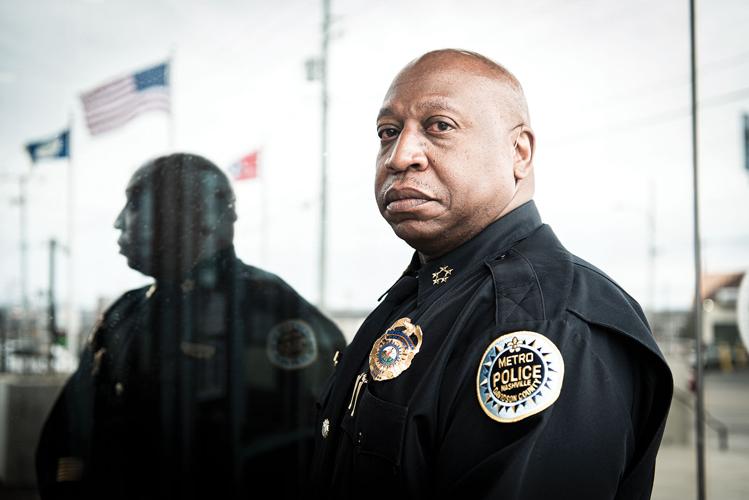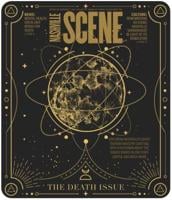These answers pull from public appearances by Mayor Freddie O’Connell during his first week in office. Some combine responses to questions from media, including the Scene and our sister publication the Nashville Post, organized by topic.
The East Bank
Mayor John Cooper spent much of his last two years in office setting up a complete redevelopment of the East Bank, anchored by a new $2.1 billion Titans stadium. Boston-based real estate firm the Fallon Co. won a recent bid to oversee the development of city-owned land on the East Bank, a project that will demand significant city resources and attention over the next four years.
“I don’t think the East Bank 10 years from now will look exactly like Fallon’s submission, but they seem to be on the right track with park elements, infrastructure elements, housing and the overall mix of uses. They seem to be in the ballpark of affordable housing units, but we still have a lot of work to do to figure out whether these are long-term affordable, what are the income thresholds, how much is workforce housing, how much is very low-income.”
“The tension of the overall project will be what is encumbered by the financial necessities of the overall deal. We saw with River North there was a form of tax increment financing that came into that proposal. The good news is this was a reclamation of public land. We get some choice about how we value that for things the city needs, including long-term affordable housing and a potential expansion of our property tax base. The project of this quarter is to develop something with the business and legal components to take a final contract [with Fallon] to Metro Council by the end of the year.”
“With the Titans stadium in particular, I don’t intend to go back and relitigate that. We’re going to make substantial public investment produce as significant a return as it possibly can.”
Transit
O’Connell separated himself during the campaign with his sophisticated understanding of public transit in Nashville and constant pledges to improve how the city moves. Expanding bus and rail have been elements of his promise to improve Nashville mobility.
“The federal railway administrator was here to present a check for just over $20 million for bridge repairs for short-line railroads in Middle Tennessee. A couple of the private rail operators were there. [State transportation commissioner] Butch Eley was there. It was a local, state and federal initiative. We talked about potential upgrades to the short-line route that includes the [Music City] Star; the likeliest path we have for rail service is actually hours and frequency updates to the Star. Potentially there are a couple other stops along the way that we could add.”
“The long-term view of Middle Tennessee has two things to consider. There has long been the idea that you could have a commuter rail alignment from Nashville to Clarksville similar to the Star. It could connect up to light rail capacity in the city eventually. If we got the overall transit initiative right, we could potentially be looking at gold-standard bus rapid transit to and from the airport. There’s been a lot of talk about [private rail operator] CSX and north-south alignments there — I think that’s less likely. Commuter rail to Clarksville and improvements on the Star gives us two east-west spurs of commuter rail potentially connecting up to a long-term light rail scenario in Nashville.”
“The third element is something I know the state is working on: Amtrak. I know Chattanooga is looking at some proposals. Nashville is on several of the proposed Amtrak maps. If there is anything we can do as a local government to accelerate the likelihood of restoring passenger rail service beyond Nashville and beyond Middle Tennessee, we certainly want to be a part of that.”

MNPD Chief John Drake
Police
Mayor Cooper tapped John Drake to lead the Metro Nashville Police Department as chief in November 2020. Since then, the department has struggled with hiring and retention, despite being flush with financial support from the mayor’s office. Arrests related to violent crime remain concentrated in a few districts near downtown. Overall violent crime statistics per capita have ticked up in recent years, though remain far below the highs of the 1990s.
“It has helped the department that we increased new recruit pay and increased across-the-board pay for first responders and specifically police. In the transition briefing we had with Chief Drake, [he said] he believes we will fully staff the department — for the first time I’m aware of — by sometime next year. He had a recruiting class schedule that he showed me. The other piece of good news is that we just received a $2 million grant from partners at the federal level that should allow us to do a full three-year implementation of group violence intervention as we’ve watched gun violence increase here in Nashville. We know that in so many scenarios where gun violence exists in a community, there tend to be a small number of people pulling the trigger in unlawful scenarios. Group Violence Intervention has been a program that started as a pilot just a few months ago; this expansion should be a really good model for us. It will supplement all traditional patrol scenarios.”
Community Oversight Board
The state legislature abolished community oversight boards this year, explicitly threatening official police accountability bodies in both Memphis and Nashville. Now the city must chart a future for the members and staff of the Metro Nashville Community Oversight Board, established by referendum in 2018 after the police killings of Jocques Clemmons in 2017 and Daniel Hambrick in 2018.
“We saw preemptive activity from the [Tennessee] General Assembly that we have not seen in Nashville previously, including an effort to roll back things that Nashville voters said a few years ago that we wanted, including a strong civilian oversight model for police.”
“State law has forced us to reconstitute what is moving from a Community Oversight Board to a civilian review board. We have to go through a rehiring process and reconstitution. There is basically a drop-dead date of Oct. 29, with a board meeting on Oct. 27. We have to have board members in place, hire a new director and have that director make recommendations about staff. There is a possible world in which all staff are retained with different roles.”
Repairing the City-State Relationship
A suite of bills aimed at Nashville passed through the state legislature during this year’s session, prompting lawsuits from the city and bureaucratic crises across Metro. The city-state relationship was among voters’ top priorities in the mayor’s race this summer.
“I don’t know what repair looks like. We have seen unprecedented encroachment on the sports authority, convention center authority and airport authority. I can’t anticipate that the state is going to walk back any of those unless legally required to do so. I don’t think they’re going to do it out of goodwill. [Sept. 28] was a strong starting point, with the federal rail administrator being here and Commissioner Eley directly participating. From a regional basis, there is probably a lot of alignment around economic development and infrastructure cooperation. There may be less alignment around things like education.”
“I do expect to meet with Gov. Lee one-on-one. We’ve had great contact already with the comptroller’s office, the secretary of state and leadership in both legislative chambers. We’d like to at least be communicating regularly so that we are transparent about the things that we want to work on on behalf of Metro and look for those opportunities to collaborate.”







